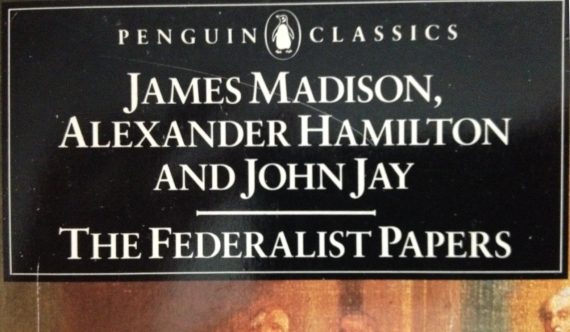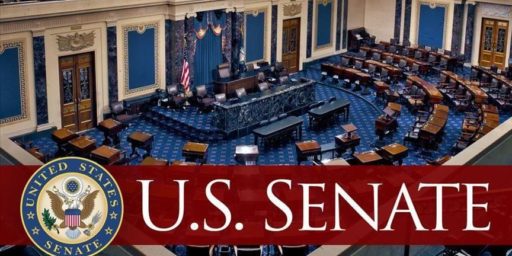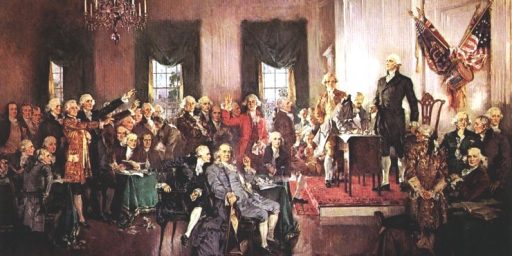Hamilton on Super-Majorities
Looking to Federalist 22.

Note: while this post is inspired by yesterday’s discussion, this is only about pro-filibuster arguments and has nothing to do with commissions about January 6th, or the lack thereof. Really, what happened was that yesterday’s discussion of the filibuster made me to decide to finally start reading Adam Jentleson’s Kill Switch, which reminded me of Fed 22.
Not to play the game of referring back to the holy texts to make a point about the now, it is nonetheless interesting to note that Alexander Hamilton had some strong statements against super-majority requirements for the purpose of legislating (or, really, for governing). Specifically, he wrote about this in Federalist 22 in pointing out the problems with the Articles of Confederation, the short-lived constitution that governed the US (kind of) from 1777 to 1789.
Indeed, anyone who knows much of anything about our ill-fated attempt at confederation (a system in which each of the 13 states was truly sovereign and co-equal and wherein the central government lacked any real power) during that time-frame knows that a major problem for basic governance was the fact the states each had one vote and it required a super-majority to do anything.
As I noted in a post in March (which quoted an editorial that quoted Fed 22:):
a point that I should make more often is that the Philadelphia conventioneers who wrote the US Constitution were explicitly replacing a document that required a super-majority to pass any legislation under the Articles of Confederation (9/13 or almost 70%). They knew the problems of governing when a minority can block legislation.
And, indeed, this seems like a good time to point this out again. So, let’s turn to some key quote from Hamilton in Fed 22 (all emphases mine):
The right of equal suffrage among the States is another exceptionable part of the Confederation. Every idea of proportion and every rule of fair representation conspire to condemn a principle, which gives to Rhode Island an equal weight in the scale of power with Massachusetts, or Connecticut, or New York; and to Deleware an equal voice in the national deliberations with Pennsylvania, or Virginia, or North Carolina. Its operation contradicts the fundamental maxim of republican government, which requires that the sense of the majority should prevail. Sophistry may reply, that sovereigns are equal, and that a majority of the votes of the States will be a majority of confederated America. But this kind of logical legerdemain will never counteract the plain suggestions of justice and common-sense. It may happen that this majority of States is a small minority of the people of America3; and two thirds of the people of America could not long be persuaded, upon the credit of artificial distinctions and syllogistic subtleties, to submit their interests to the management and disposal of one third.
Take away the style of prose at the time and this could be written now about the filibuster. Please note he connects “the fundamental maxim of republican government” to a requirement that “the sense of the majority should prevail.” And he calls “sophistry” the notion that a majority of states equals a majority of the country. (And yes, I am aware that some of this paragraph could be level at the Senate itself, despite it being, itself, a gift of the Framers).
He goes on to describe a typical defense of super-majorities–basically that since a super-majority contains the majority, by definition, it must be even better than a mere majority for decision-making:
It may be objected to this, that not seven but nine States, or two thirds of the whole number, must consent to the most important resolutions; and it may be thence inferred that nine States would always comprehend a majority of the Union. But this does not obviate the impropriety of an equal vote between States of the most unequal dimensions and populousness; nor is the inference accurate in point of fact; for we can enumerate nine States which contain less than a majority of the people; and it is constitutionally possible that these nine may give the vote. Besides, there are matters of considerable moment determinable by a bare majority; and there are others, concerning which doubts have been entertained, which, if interpreted in favor of the sufficiency of a vote of seven States, would extend its operation to interests of the first magnitude. In addition to this, it is to be observed that there is a probability of an increase in the number of States, and no provision for a proportional augmentation of the ratio of votes.
His description of this argument is that it is “poison” and notes what I constantly state about super-majority rules: they empower the minority.
But this is not all: what at first sight may seem a remedy, is, in reality, a poison. To give a minority a negative upon the majority (which is always the case where more than a majority is requisite to a decision), is, in its tendency, to subject the sense of the greater number to that of the lesser.
Super-majority requirements sound like they force consensus because they require more people to agree, but that assumes that a super-majority is motivated to agree. They frequently are not. Moreover, and more importantly, the controlling faction under such rules is not the large one, but it is the smaller one. A super-majority requirement gives the veto pen (“a negative upon the majority”) to the minority. People hear “super-majority rule” and think “that means more people are involved in decision-making! Cool, that means more compromise!” That only is true if a decision has to be made. If we only get to eat if 60 out of 100 of us agree on what to eat, at some point a decision will be reached.
However, for legislation, wherein no action is a viable option, setting the bar at 60 votes means the 41 actually rule.
Put another way: for any given legislative proposal “winning” can be defined both as passage of the bill and defeat of the bill, depending on one’s point of view. There is zero reason to assume that there is a compromise position for passage of the bill that would be seen as a win for a super-majority. Defeat of the bill is often what a large minority wants and therefore there is no motivation for them to join a compromise coalition.
In the same paragraph, he describes the way in which small states, representing far fewer citizens than the others, have been able to thwart the Congress due to these rules (again, a few tweaks and this becomes an article from 2021 about the problems with the filibuster, to include a nod to the fact people think more agreement is always better).
A sixtieth part of the Union, which is about the proportion of Delaware and Rhode Island, has several times been able to oppose an entire bar to its operations. This is one of those refinements which, in practice, has an effect the reverse of what is expected from it in theory. The necessity of unanimity in public bodies, or of something approaching towards it, has been founded upon a supposition that it would contribute to security.
The result?
But its real operation is to embarrass the administration, to destroy the energy of the government, and to substitute the pleasure, caprice, or artifices of an insignificant, turbulent, or corrupt junto, to the regular deliberations and decisions of a respectable majority. In those emergencies of a nation, in which the goodness or badness, the weakness or strength of its government, is of the greatest importance, there is commonly a necessity for action. The public business must, in some way or other, go forward. If a pertinacious minority can control the opinion of a majority, respecting the best mode of conducting it, the majority, in order that something may be done, must conform to the views of the minority; and thus the sense of the smaller number will overrule that of the greater, and give a tone to the national proceedings. Hence, tedious delays; continual negotiation and intrigue; contemptible compromises of the public good. And yet, in such a system, it is even happy when such compromises can take place: for upon some occasions things will not admit of accommodation; and then the measures of government must be injuriously suspended, or fatally defeated. It is often, by the impracticability of obtaining the concurrence of the necessary number of votes, kept in a state of inaction. Its situation must always savor of weakness, sometimes border upon anarchy.
The degree to which the above paragraph describes a good bit of where we are at the moment is striking (and, again, I mean in terms of broader US governance, not about a 1/6 commission, although that issue is an extremely easy to understand example).
The exact problem Hamilton was arguing against, specifically, a Congress that operated solely on super-majorities and, therefore, on minority rule, has become a feature of our current Congress given the way the Senate operates.
It does, “destroy the energy of the government” and it does substitute privilege the will “of an insignificant, turbulent, or corrupt junto” over that of “the regular deliberations of a respectable majority.”
There is no doubt that that “the sense of the smaller number” overrides “that of the greater, and give[s] a tone to the national proceedings.” Is there any doubt, even at a time of unified government, that the minority party doesn’t have an outsized role in setting the agenda?
Is it not the case that while sometimes compromise can be had that needed policy desired by the majority are often ‘injuriously suspended” if not “fatally defeated”?
To be clear, I am not providing this dive in Fed 22 in a game of proof-text. But, it is extremely telling the degree which, in some quarters, a mythology has taken hold that the filibuster is reflective of the Framers’ own design of the Senate. This is unequivocally not true.
Further, it strikes me as noteworthy that Hamilton here is writing from the point of view of practicality: he is specifically diagnosing a problem that was empirically observed in the Congress under the Articles. Further, it really is striking as to the degree to which those practical observations about legislative dynamics under super-majority rule are quite relevant now.
A parting observation is that Hamilton identifies “republican government” with majority rule, which is yet more confirmation that those who think things like the filibuster are part of the “republic, not a democracy” formulation (or that having a “republic” doesn’t mean majority rule) really don’t know what they are talking about.
A postscript on this from Madison’s Vices of the Political System of the United States came to mind wherein he, too, was criticizing the way the Congress functioned under the Articles: “According to Republican Theory, Right and power being both vested in the majority, are held to be synonymous [sic].”





Do you have Joe Manchin’s number? You could call him up and read this over the phone to him. Better yet, we get Lin-Manuel Miranda to do it as a rap, and get him on the phone to Manchin.
While I mostly agree with this, it’s noteworthy that Hamilton was outvoted at the convention. He wanted a much more unitary, majoritarian government than he got. There are supermajority provisions in the Constitution (treaties and amendments come to mind) and of course the small states won outsized power.
I do think an argument can be made that requiring supermajorities for things not specified in the Constitution is extra- or even un-Constitutional, but the courts have never seen it that way.
This is excellent.
@James Joyner:
And SCOTUS is unlikely to change this position due to the provisions in the Constitution that give each chamber of the Congress the authority to set its own rules
@James Joyner:
I know I keep disagreeing with you this weekend, but I don’t think this is relevant to understanding Fed 22 nor of the case he is making in these quotations.
Heck, Madison opposed the Great Compromise, so it isn’t like the Federalist Papers are a perfect reflection of M, H, and J’s most sincere preferences.
This is true, but I am not sure what it matters. The discussion at hand is not whether super-majority rules are always and forevermore unacceptable (an argument that I would not make). The issue I am addressing, and that Hamilton was addressing, was whether such rules are good for legislating.
@James Joyner: @Doug Mataconis: I would note, I said nothing about court challanges.
@Michael Reynolds: I would gladly defer to LMM on this.
@Gustopher: Thanks.
@Doug Mataconis: Indeed, FWIW, I believe the cloture rule to be constitutional. But that’s not the issue.
@Steven L. Taylor: No, we agree. I’m just saying that the Senate seems to go against the first Hamilton quote. I have increasingly come to see the Federalist as a propaganda document rather than a guide to understanding original intent. Indeed, I’m increasingly of the view there is no such animal.
@James Joyner: Indeed.
Well, I’m not a fan of “original intent”. I do think precedent and tradition matter, though.
But “original intent”? Whose intent are we talking about? For instance, the other 2 delegates from NY besides Hamilton left the convention during the summer with the intention of never return. What do we make of that “original intent”?
When someone is talking about original intent, I always suspect them of necromancy – of resurrecting the dead to do combat on their behalf. It’s never neutral – they are picking and choosing.
@James Joyner:
Gee, what took you so long. Cracker and i were taught that the Federalist papers were nothing more that Parade supplements advertising the then proposed Constitution. Nixon was president.
Also, IMO, believers in “original intent” as a unified theory also believe there’s a unicorn in the back of the stable they’re shoveling out.
Wow, so timely! Thanks, Steven!
@Jay L Gischer: @Flat Earth Luddite: The Constitution, and essentially all legislation, are products of compromise so it makes little sense to take one person’s arguments during the debate—even in selling the final compromise document—as perfectly encapsulating what “they” intended. In terms of judicial interpretation, it’s reasonable to look at the text of the final documents as the best indication of what the law is and, in doing so, it’s reasonable to seek to understand what the words meant in historical context. But, even there, there are limits.
@Jay L Gischer:
I believe that original intent should be a factor in making decisions–but it’s only one factor, and not the most important. I see it as a “governor” on legislation and judicial decision. The 4th Amendment comes to mind (partly because of the recent SCOTUS decision). The “original intent” of the 4A is to restrain government intrusion into our personal matters. That’s a factor that needs to be kept in mind when legislating or judging anything that might run up against the 4A.
I think that the writers and signers of the Constitution would be aghast at the “100-mile Constitution-Free Zone” that encompasses about 60% of the US population.